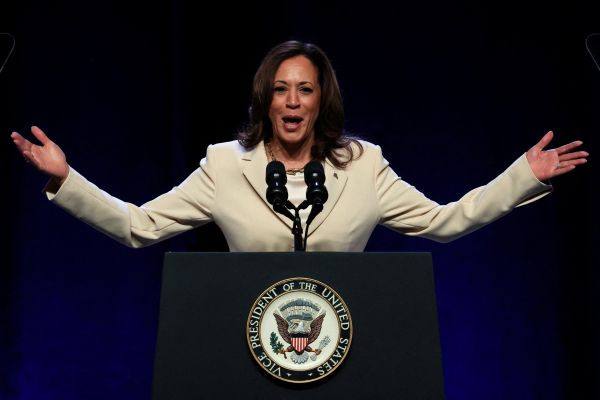Vice President Kamala Harris’s first major interview since taking office was highly anticipated, offering the public insight into her views on key issues, her role within the Biden administration, and the challenges she faces as the first woman, first Black, and first South Asian Vice President of the United States. The interview provided a platform for Harris to address both her achievements and criticisms while shedding light on the administration’s priorities and the complexities of her position. Here are the key takeaways from that pivotal conversation.
1. Defining Her Role in the Administration
One of the most significant aspects of the interview was Harris’s explanation of her role as Vice President. While the Vice Presidency is often seen as a largely ceremonial position, Harris emphasized that she is deeply involved in policy discussions and decision-making processes within the administration. She highlighted her involvement in critical areas such as voting rights, immigration reform, and foreign policy.
Harris stressed the importance of being a partner to President Biden, describing their working relationship as one based on mutual respect and collaboration. She pointed out that her background as a former Senator and Attorney General gives her a unique perspective on many of the issues facing the country, and she is using this experience to help shape the administration’s approach to governance. This emphasis on her active role challenges the traditional view of the Vice Presidency as a secondary position, instead framing it as a critical component of the administration’s leadership team.
2. Addressing Criticisms and Challenges
Throughout the interview, Harris was candid about the criticisms she has faced since taking office. She acknowledged that her tenure has been marked by significant challenges, including the ongoing pandemic, rising tensions with foreign adversaries, and the deeply polarized political climate in the United States.
Harris addressed the criticism that she has been less visible than expected, particularly on high-profile issues like immigration and voting rights. She explained that much of her work is behind the scenes, involving extensive policy discussions, negotiations, and strategy development. Harris also highlighted the challenges of navigating these complex issues, many of which have deep-rooted historical and structural factors that cannot be easily resolved.

Additionally, Harris acknowledged the heightened scrutiny she faces as a trailblazer in her role. She pointed out that being the first woman and person of color in the Vice Presidency brings both opportunities and obstacles, including the challenge of overcoming stereotypes and biases that often shape public perceptions. By addressing these challenges head-on, Harris sought to provide a more nuanced understanding of her work and the obstacles she faces.
3. A Focus on Voting Rights
Voting rights have been a central focus of Harris’s work, and the interview provided her with an opportunity to discuss this issue in depth. She expressed deep concern about the wave of restrictive voting laws being passed in various states, which she described as a threat to the fundamental principles of democracy. Harris reiterated her commitment to protecting and expanding access to the ballot box, particularly for historically marginalized communities.
Harris emphasized the importance of federal legislation to safeguard voting rights, such as the John Lewis Voting Rights Advancement Act and the For the People Act. She explained that while the administration is pushing for these bills, the path forward is challenging due to the narrow margins in Congress and the Senate filibuster. Nevertheless, Harris underscored her determination to continue fighting for these critical reforms, framing the issue as essential to the future of American democracy.
Her focus on voting rights reflects the administration’s broader commitment to addressing systemic inequalities and ensuring that all Americans have the ability to participate fully in the democratic process. Harris’s passion for this issue was evident, and she made it clear that she views the protection of voting rights as one of the defining challenges of her tenure.
4. Immigration: A Complex and Contentious Issue
Immigration is another area where Harris has been deeply involved, and the interview provided her with an opportunity to clarify the administration’s stance on this contentious issue. Harris acknowledged the complexity of the immigration system and the difficulties in finding a balance between enforcement and humanitarian concerns.
She highlighted the administration’s efforts to address the root causes of migration from Central America, such as poverty, violence, and corruption. Harris emphasized that the administration’s approach is not just about managing the border but also about improving conditions in the countries of origin to reduce the need for people to flee. She pointed to her recent trips to Central America and Mexico as part of a broader strategy to engage with regional leaders and develop solutions that address the underlying issues driving migration.
However, Harris also faced tough questions about the administration’s handling of the border crisis and the criticisms it has received from both sides of the political spectrum. She acknowledged the challenges but defended the administration’s approach, arguing that immigration reform requires comprehensive and compassionate solutions rather than quick fixes. Harris’s discussion of immigration highlighted the difficulties of navigating an issue that is deeply divisive and fraught with political pitfalls.
5. Foreign Policy and Global Leadership
The interview also touched on Harris’s role in foreign policy, an area where she has taken on significant responsibilities. Harris discussed the administration’s approach to global challenges, including the rise of authoritarianism, climate change, and the ongoing pandemic.
She emphasized the importance of restoring America’s leadership on the world stage, particularly in the wake of the Trump administration’s "America First" policies, which she argued had damaged the country’s international relationships. Harris highlighted the administration’s efforts to rebuild alliances, particularly with NATO and other key partners, and to re-engage with multilateral institutions like the United Nations and the World Health Organization.
Harris also spoke about the administration’s approach to China and Russia, two countries that represent significant challenges to U.S. foreign policy. She described the administration’s strategy as one of competition and cooperation, where necessary, while standing firm on issues like human rights and cybersecurity.
Her comments on foreign policy underscored the administration’s commitment to multilateralism and diplomacy, as well as the recognition that addressing global challenges requires a coordinated and cooperative approach. Harris’s role in these efforts highlights her involvement in shaping the administration’s foreign policy agenda and her commitment to promoting American values on the world stage.
6. Looking Forward: Harris’s Vision for the Future
As the interview drew to a close, Harris reflected on her vision for the future and the legacy she hopes to leave. She spoke about the importance of tackling systemic inequalities, promoting justice, and ensuring that all Americans have the opportunity to succeed. Harris emphasized the need for bold and transformative policies that address the root causes of social and economic disparities.
Harris also expressed optimism about the future, despite the many challenges facing the country. She spoke about her commitment to working with President Biden to build a more just and equitable society and to leave a lasting impact that will benefit future generations.
Conclusion
Vice President Kamala Harris’s first major interview offered a comprehensive look at her role within the Biden administration, her views on key issues, and the challenges she faces as a trailblazer in American politics. From her focus on voting rights and immigration to her involvement in foreign policy, Harris made it clear that she is an active and engaged leader, working to address some of the most pressing issues of our time. As she continues to navigate the complexities of her role, Harris’s actions and decisions will undoubtedly shape the course of the administration and the future of the country.



